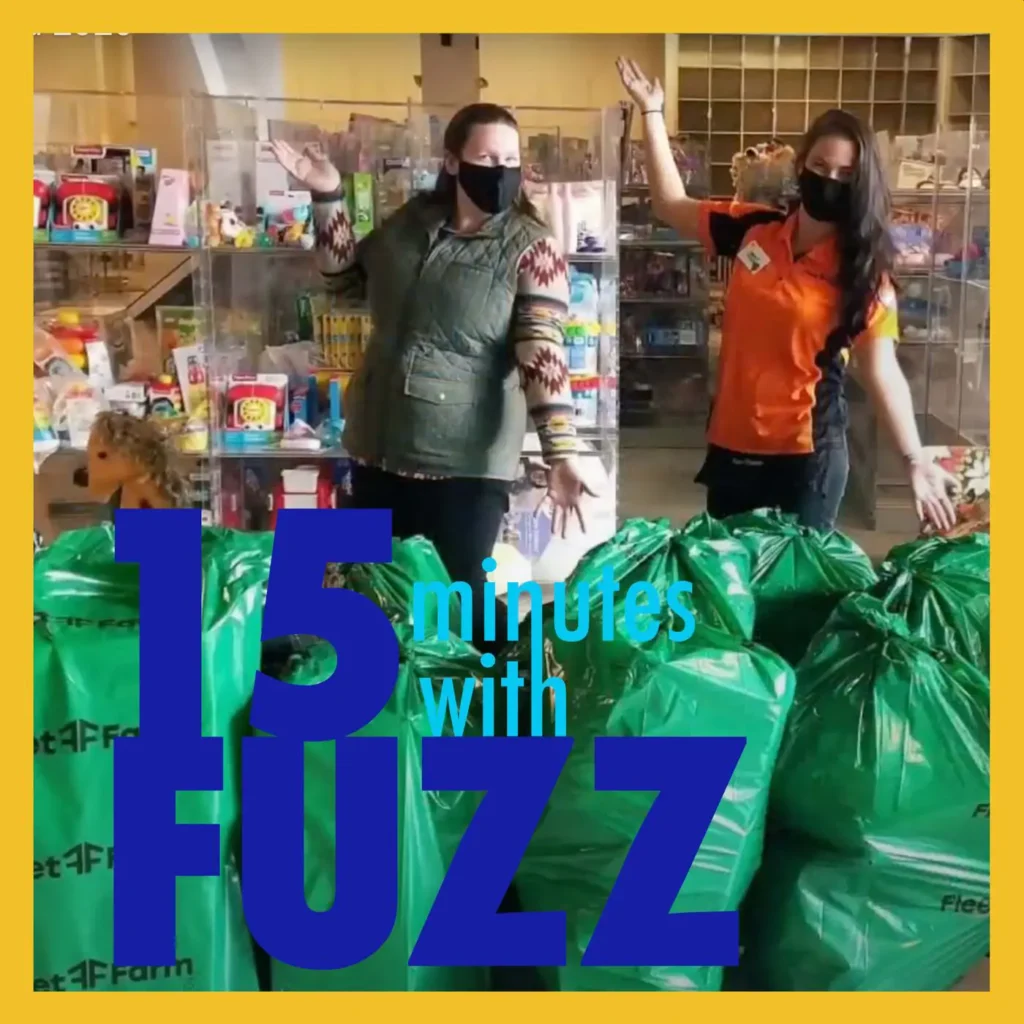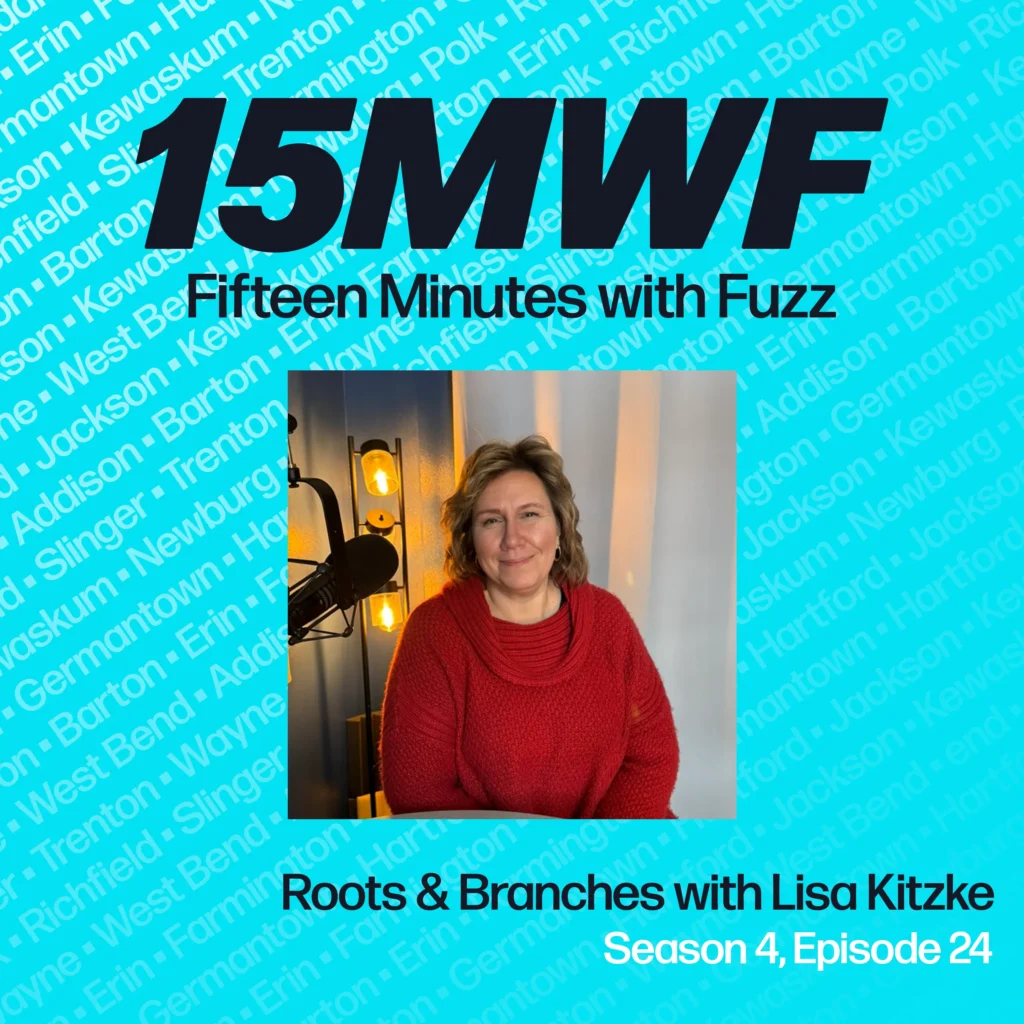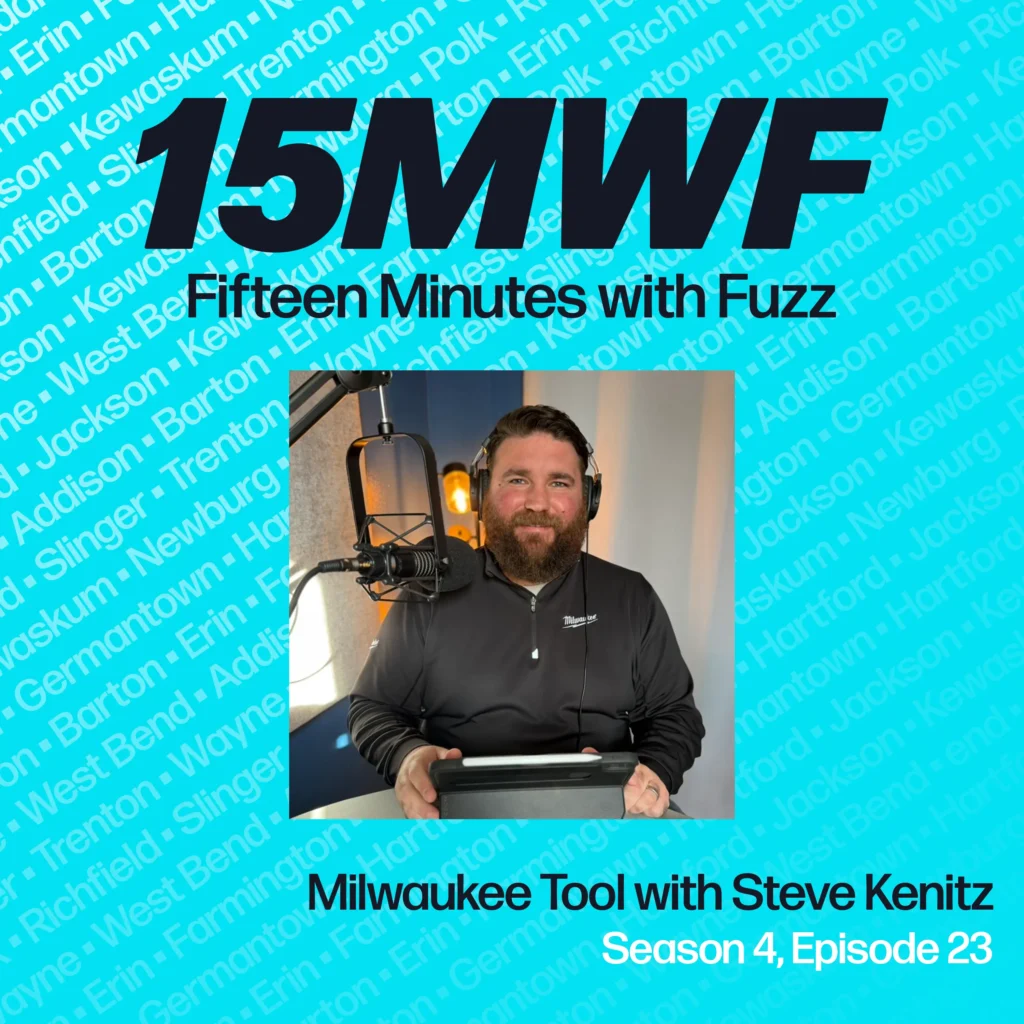Each year, the Youth & Family Project in West Bend hosts a program called the Gingerbread House. Emily Greene joins me this week to talk about this program which helps make sure kids throughout Washington County find gifts under their Christmas Trees during the holiday season!

Fifteen Minutes with Fuzz
A podcast about positive things happening in and around Washington County, Wisconsin
The Youth & Family Project Gingerbread House with Emily Greene

Transcript
(click to expand)[00:00:00] Fuzz Martin: Why did the president pardon the turkey? Because the turkey was convicted of foul play. Huh? Huh? Happy Thanksgiving week. And thanks for listening to 15 minutes with fuzz. I am fuzz Martin. I am the fuzz in the title. And this is a show where we talk about good things happening in Washington County, Wisconsin.
I am thankful that I’ve been able to talk to. 18 different great things, organizations, people, events here in Washington County. So far since I started the show in August and I’ve met a lot of great people and I’ve learned a ton and I’m always looking to learn more. If you have any Any ideas for the show, email me, 15withfuzz at gmail.
com, or you can message me, I’m on Instagram, Facebook, Twitter, basically I’m saying I’m really super easy to get a hold of. If you need to get in touch with me, you can figure it out. It’s really easy. Don’t be bashful. I love this stuff. This week, I’m We’re talking about a project that is really near and dear to our hearts here in the Martin household.
Each year the Youth and Family Project of West Bend finds donors to buy presents to put under the trees of those less fortunate in Washington County over the Christmas season. The project is called the Gingerbread House. The organization is called the Youth and Family Project and Epic Creative, uh, the agency that, where I’m a partner, we participate every year.
My wife, Shanna, thinks it’s a lot of fun picking out gifts for kids and knowing that we’re able to bring them, uh, you know, something to put under their tree so they have a great Christmas. And we’re really proud to be a part of that. And my guest this week is Emily Greene, the executive director at the Youth and Family Project and the Gingerbread House.
And she’s going to give us a look at this wonderful program.
Emily, thanks for coming in. Let’s start by talking about the Youth and Family Project. What does the Youth and Family Project, who do they serve and what’s, what does the organization do?
[00:02:32] Emily Greene: Absolutely. So the Youth and Family Project has been around since 1975. We got our start by running a version of what we now do, our Crossroads Youth Program.
And that is a program that serves youth who are at risk of running away, which really means anything. Um, it could be youth with mental health issues, that kind of thing. We also have a program that offers supervised visitation and safe exchange for families who’ve been separated by either the court system or child protective services.
And then kind of our shining star of the organization is our Gingerbread House program. And that’s a program that connects families in need with sponsors in the community who are able to purchase gifts for them at the holiday season.
[00:03:09] Fuzz Martin: Yeah, that is something that we do here at Epic Creative. We’ve been doing it for a number of years.
It’s a big thing in my household because we feel as a family who has the privilege to be able to do this. Provide gifts for our kids. And we feel we should be able to help others who maybe aren’t as lucky in that regard. So it’s an annual program, the gingerbread house. Can you give us kind of an overview of who the program supports?
[00:03:33] Emily Greene: Yeah, absolutely. So the gingerbread house program is really in place for families who have some kind of financial need. So again, that can mean a lot of things, especially given the pandemic it may be families who qualify for state benefits like forward health cards or food share benefits. But sometimes too, it’s just a family with a known financial need.
Like maybe they have had a medical emergency and have a lot of bills that are adding up or running behind on their bills and need to catch up. There’s not a real strict guideline for the program, but we do have, you know, things in place to ensure that the families that are signing up are in need for the program.
[00:04:08] Fuzz Martin: Sure, certainly. I am, but. When it comes to this time of year, I mean, just trying to imagine being a family who has children and wants to provide a good, you know, Christmas experience for their children, but don’t have the financial needs. The Gingerbread House really helps with that.
[00:04:25] Emily Greene: Yeah, absolutely. And, you know, Christmas time is pretty stressful for everybody, you know.
Kind of, um, a big deal to make sure you get all the gifts in time and all of that. And I think when, when you’re worrying about whether you can put food on the table or whether you can pay your electric bill, Christmas time becomes that much more stressful and we want to help alleviate that stress from the family so that.
You know, they can really just sit down, have a good time together and really build those positive family memories.
[00:04:51] Fuzz Martin: And also the children knowing that the kids they go to school with and the other, you know, neighbors and such are having this experience and making sure that they Experience that too, I think is very important.
[00:05:03] Emily Greene: Right. Absolutely.
[00:05:04] Fuzz Martin: How many families has, have benefited from Gingerbread House over the years?
[00:05:11] Emily Greene: Over the years, that would be a very large number. The program has been in operation since I believe 2001.
[00:05:17] Fuzz Martin: Okay. Um,
[00:05:19] Emily Greene: Last year alone, we served 486 families.
[00:05:21] Fuzz Martin: Wow. Okay.
[00:05:22] Emily Greene: And each year in the recent past, it’s been right around that 400 to 500 mark.
It seems like since 2018, it’s grown by, you know, at least 15 to 20 families each year. So I’m not sure what to anticipate for this year, but we will see. Yeah.
[00:05:38] Fuzz Martin: Did you see a An increase during COVID was, uh, during the beginning of COVID in that first kind of uncertain year, was there, was there an increased need for that?
[00:05:47] Emily Greene: Yeah, I think when all was said and done, we had about 30 additional families who signed up. But what I did notice with the families during the pandemic is that, you know, there was a more acute need. There was significantly more families who were worried about being able to pay their bills, being able to pay rent and things like that.
Whereas, you know, that certainly happens, um, every year with the program, but I feel like it was a higher intensity last year.
[00:06:11] Fuzz Martin: Overall, do you, do you have a, so it’s been going on since 2001, so I’m not sure if you’d even be able to calculate this, but do you have an approximate value of how much has been donated over the years?
[00:06:22] Emily Greene: Um, over the years, no. Okay. Um, last year, let me run some numbers with you.
[00:06:27] Fuzz Martin: Sure.
[00:06:27] Emily Greene: Last year we served 486 families, which evened out to about just over 2, 000 individuals. Okay. Each individual gets at least three gifts underneath the Christmas tree. And if at a very low estimate, you anticipate that each of those families received a 15 gift, three of those 15 gifts apiece, that evens out to about 90, 000 for last year alone.
So take that back 10 years, looking at a pretty big, pretty big number. And
[00:06:56] Fuzz Martin: so the way that it works, can you kind of explain for the families in need? Because one of the things that. My wife Shanna and I love is when we, we see the, you know, we post the list at Epic and say, anybody who’d like to help out, please help out.
And then when we first see the list that we get from you, you know, we either pick a family member or two and say, all right, we’re going to get all these things, you know, you know, whether it’s toys or sometimes it’s like books West Bend, Kewaskum, Slinger,
[00:07:29] Emily Greene: West Bend,
[00:07:32] Fuzz Martin: Kewaskum, Slinger, West Bend,
[00:07:37] Emily Greene: Kewaskum, Slinger, West And since the pandemic, we’ve completely changed everything.
Most of our signup is completely virtual now. Families will go to either our Facebook or our website and follow a link to a Google form where they fill out those wishlists and fill out a family profile that, you know, gives The sponsor’s a little bit of background about the family as a whole, and then each family member fills out their own wish list that has background information about the person as far as their likes and dislikes, things like that, as well as five gift ideas.
So that way the sponsors have a little bit of wiggle room to work with as well.
[00:08:13] Fuzz Martin: Sure. Yeah. You get the age and gender of the individual, their sizes and, and all that. And it makes it really easy for you to go down and buy stuff. I mean, it’s very easy to do, but. Also make sure that they’re getting the things that, you know, really make a difference for them.
[00:08:30] Emily Greene: Right. Absolutely. And it’s really exciting. Some sponsors that we have will stick pretty stringently to that list and then others will kind of go rogue, as I like to say, and they’ll, they’ll still get items on the wishlist, but then they’ll try to get, you know, some extras for the family. And I think a lot of people have fun with that process and getting creative with the list.
[00:08:50] Fuzz Martin: Yeah. Yeah. Finding things they like. Yeah. It’s a lot of fun. This is going to take, uh, 400. And how many, did you say 430?
[00:08:57] Emily Greene: 486.
[00:08:59] Fuzz Martin: 486 families, so up to like 2, 000 people. That’s got to be a big organizational kind of effort on you, and I assume there’s some volunteers involved?
[00:09:09] Emily Greene: Yes, absolutely. As you can imagine, GIFs for 486 family members is, you know, kind of a lot of space as well, which is certainly bigger than our, our building on, uh, West Bend.
Over on Elm Street.
[00:09:20] Fuzz Martin: Sure.
[00:09:21] Emily Greene: So each year we do have to secure a donated location and typically the owners of the building will donate not only the space for us to use, But the heat and the water and electricity bill as well. So it’s kind of a big deal. Each year it, it varies where we end up, which makes it sometimes a little bit difficult when communicating with our volunteers as far as where am I going to show up this year?
Um, and a lot of times we don’t know until the very last minute. With that, we do have typically every year about 50 to a hundred volunteers. Who will help throughout the process, whether it be the signup process, ensuring that we have enough people to answer the phone calls when it comes time to actually check, you know, their, um, eligibility for the program.
But then there’s also, you know, sorting all of the general donations that we gift, um, helping sponsors unload their vehicles. And then now with the pandemic, we’ve started doing curbside pickup as well. So sponsor or families will be able to just drive right up to the door and our volunteers will come bring the gifts out to them so that they can You know, have minimal contact with lots and lots of people.
[00:10:20] Fuzz Martin: Sure. No, that makes sense. Is this a Washington County only program?
[00:10:25] Emily Greene: Yes. Okay. Washington County only. We do occasionally have a few families from outside of Washington County if they’re connected with services or schools here in Washington County.
[00:10:32] Fuzz Martin: That makes sense. But the Crossroads program is in both Waukesha, Washington.
Right. Is that okay? Very good. Mm-Hmm. . Speaking of now, the, the people who are. Donating the gifts. How do people sign up to do that? What’s the the process for that and are you still looking for some this this episode will come out on the 22nd? Are you still looking for? People to donate?
[00:10:54] Emily Greene: Yeah, absolutely. So really they’re, you know, up until the end of pickup, there really is no time.
That’s too late to provide gifts to the gingerbread house. We, we close sign up after this week, technically. Um, but what in reality that looks like is after that signup closes, then we start a wait list for the program, which we’re not going to guarantee that they’re going to get anything, but realistically they’re going to get items underneath their gift.
Yeah. Their Christmas tree.
[00:11:21] Fuzz Martin: Great.
[00:11:22] Emily Greene: Sometimes when we have sponsors who come up, you know, late to the program, we’ll be able to connect them with someone who’s on the wait list and say, you know, this person is really in need and it would be great if they could have a sponsor because, you know, they’ve got items on their wish list that we’re not going to be able to find in our general donations.
[00:11:37] Fuzz Martin: Sure. That makes sense. And so if somebody wants to get involved with that, do they contact the Youth and Family Project?
[00:11:42] Emily Greene: Yes. You can give us a phone call. You can head over to our website. We have on the Gingerbread House tab of our website. There is a link to fill out a sponsor form, and you can email that to me, or gingerbread at youthandfamilyproject.
org, and then as soon as we receive that, we will start matching you with a family.
[00:11:59] Fuzz Martin: Excellent. And then if, if somebody wants to volunteer at the Gingerbread House, What is the process to become a volunteer there?
[00:12:08] Emily Greene: Yeah, so we will be posting those on our website. They’re not up yet.
[00:12:12] Fuzz Martin: Okay.
[00:12:12] Emily Greene: Just because we’re not quite sure, 100 percent sure on the location yet.
[00:12:16] Fuzz Martin: Sure.
[00:12:16] Emily Greene: Um, but once those are posted, you’ll be able to click the link right on our website. Otherwise, you can always follow us on the Volunteer Center of Washington County. That’s where we post all of our volunteer opportunities as well. Oh,
[00:12:26] Fuzz Martin: very good. And then, are you almost secure with a location, or are you still working on that?
[00:12:32] Emily Greene: I believe so. We kind of thought that we were gonna pick up the keys earlier this week, and then stuff happened, so we’re not entirely sure if we’re gonna be in that exact location or not. So, stay tuned. Okay, all
[00:12:43] Fuzz Martin: right, sounds good. But if you’ve got a location, and you’re like, hey, We’ll help out. Give Emily Green a call or reach out at youthandfamilyproject.
org. Emily, this is a great cause. Again, we at Epic love participating in it every year. It’s a lot of fun for our employees. It’s a lot of fun for me and my family personally, and thank you for what you’re doing for individuals in our community.
[00:13:08] Emily Greene: Absolutely. And thanks, thanks for all that you do to help support the program as well.
[00:13:11] Fuzz Martin: Absolutely. And thanks for coming on the show.
[00:13:13] Emily Greene: Thank you. It was a blast.
[00:13:16] Fuzz Martin: Thank you for listening, and thanks to Emily Greene of the Youth and Family Project for joining me. I hope you have, or have had, a fantastic Thanksgiving. If you’re a hunter, thanks for quietly listening in your tree stand. Hope you have a safe hunt.
If you’re not a hunter, look out for deer anyway. We’ll talk to you again next week on 15 Minutes with Fuzz. Thanks so much for listening. We appreciate it. You’ll find us everywhere on Facebook, Instagram, Twitter, at FifteenWithFuzz or email FifteenWithFuzz at gmail. com. FifteenWithFuzz. com is the website.
Have a great week.


